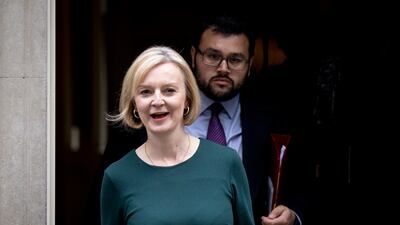UK Prime Minister Liz Truss on Wednesday turned to her cap on energy prices to dismiss a barrage of criticism from MPs over the fall-out from her government's tax-slashing mini-budget.
In her first appearance in the House of Commons since the British economy was plunged into crisis after the high-borrowing bonanza, Ms Truss was accused of "ducking responsibility" by opposition leader Sir Keir Starmer.
She repeatedly emphasised the financial help that her administration has offered to households facing rising energy costs, holding bills at £2,500 ($2,760) per year, saying it formed the major part of the controversial mini-budget.
Ms Truss also vowed to stick by her pledge not to reduce public spending.
She reiterated her confidence in her policy to place a cap on gas and electricity bills for households.
She said the Conservative government had "taken decisive action to make sure that people are not facing energy bills of £6,000".
Mr Starmer told the House that Ms Truss was "avoiding the question, ducking responsibility, lost in denial".
"No wonder investors have no confidence in her government," he said.
Ms Truss said in criticising the mini-budget, Mr Starmer was “opposing the very package that we brought in, an energy price guarantee”.
“That was the major part of the mini-budget that we announced,” she said.
She also pointed out that the opposition leader has so far declined to say whether he supports the energy price cap for two years. Before Ms Truss announced the cap in September, Labour had called for energy bills to be frozen at £1,971 a year for six months.
Defending her plans, she said her government is helping people cope with rising bills by lowering stamp duty, introducing an energy price cap and keeping taxes low.
Mr Starmer shot back by accusing her of trying to hide the damage the mini-budget had inflicted on the economy. “Everyone can see what has happened,” he said. “The Tories went on a borrowing spree, sending mortgage rates through the roof ― they are skyrocketing by £500 a month.”
Ms Truss insisted she would not cut public spending to balance the books as economists and financial markets continued to express doubt over the effectiveness of her approach.
The prime minister said she was "absolutely” not planning public spending reductions, but insisted taxpayers’ money would be used well.
The cost of government borrowing increased on Wednesday while sterling fell against the euro and dollar in the latest signs of market turbulence.
Business Secretary Jacob Rees-Mogg suggested the Bank of England’s failure to raise interest rates in line with the US was driving the turmoil in financial markets rather than Kwasi Kwarteng’s mini-budget.
Asked if Ms Truss believed Andrew Bailey was doing a good job as governor of the central bank, her official spokesman said: “Yes. You have seen the Bank of England make a number of interventions recently.
“There are complex global issues at play which do feed into this.”
While Ms Truss was appearing in the Commons, the Treasury Select Committee was taking evidence from economists.
Torsten Bell, of the Resolution Foundation, told MPs that Mr Kwarteng would have to perform a further U-turn on his plan to cut taxes if he wanted to restore the government’s economic credibility.
“Given where we are, in a very serious situation, I don’t think there is a credible, plausible package that’s going to work now on the 31st [of October] that doesn’t involve U-turning on more of these," he said.
“Because markets are going to need to see the government saying ‘I’ve changed course’.”
He suggested that reversing the plan to abolish the planned corporation tax rises would be the “easiest to do” among the major announcements, along with some of the more minor measures that Mr Kwarteng had set out “which we should obviously not be going ahead with”.
Ms Truss's appearance at Prime Minister’s Questions came less than three weeks after the economy was plunged into crisis by Mr Kwarteng’s tax-slashing, high-borrowing mini-budget. The package, which included £45 billion worth of tax cuts, caused the pound to drop to a 37-year low and caused chaos in financial markets.
Although the government later backtracked on its pledge to cut the 45p tax rate for higher earners, the damage was done. Such was the unpopularity of the policy that it helped Labour to open up a 17-point lead over the ruling Conservatives in the polls.
The Bank of England was forced to make an emergency intervention to restore order by announcing it would buy long-dated UK government bonds, known as gilts. There was further humiliation for the Truss administration this week when the central bank again said it would buy up government debt.
Ms Truss has repeatedly refused to cave in to pressure from Labour to introduce a windfall tax on the profits of oil and gas companies to partly fund support for UK households in the grip of a cost-of-living crisis.
She is considering raising welfare payments in line with earnings rather than inflation, which would hit the poorest households hardest. It would mean benefits would increase by 5.5 per cent rather than about 10 per cent, according to recent official data, saving about £5bn.
But the prime minister, who succeeded Boris Johnson last month, is reportedly considering a U-turn in an attempt to avoid a mutiny by Conservative MPs.


